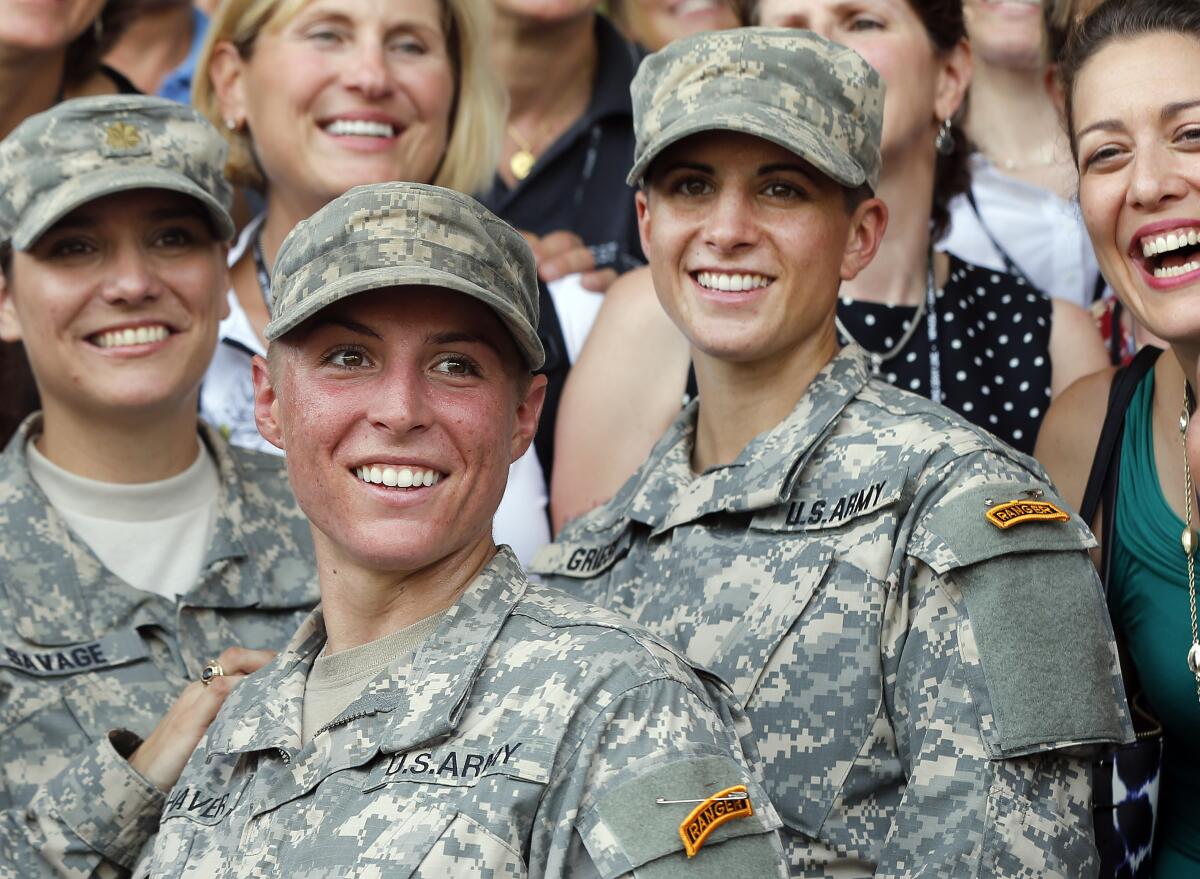Column: Should women be exempt from the draft? The Supreme Court took a pass on deciding

The question of whether women should serve in front-line combat roles was settled years ago, when the Obama administration officially rescinded a long-standing ban on such duty.
So why do we still require only men to register with the Selective Service System when they turn 18? Why has the struggle for gender equality stopped at the door of the draft board?
Or why, on Monday, did the Supreme Court turn down the chance to bring the country’s military traditions into the 21st century? It did so by opting not to hear a case brought by the National Coalition for Men, which argued the male-only registration rule violates the 5th Amendment’s protection against discrimination based on gender.
Rarely have I found myself on the same side of an issue with a group dedicated to ending discrimination against men, but I am in total agreement that male-only military conscription is not just sexist, it’s unconstitutional.
It would have been so simple for the court to overturn its 40-year-old precedent that women should be exempt from registration. After all, that decision came down in 1981, at a time when women were technically restricted from combat roles. (I say “technically” because women have given their lives in every American conflict going back to the Revolutionary War.)
Instead, the court punted.
Justice Sonia Sotomayor, joined by justices Stephen Breyer and Brett M. Kavanaugh, acknowledged in a statement that “thousands of women have served with distinction in a wide range of combat roles, from operating military aircraft and naval vessels to participating in boots-on-the-ground infantry missions.”
However, she wrote, the court has traditionally deferred to lawmakers when it comes to matters of national defense and military affairs, and the issue is currently pending before Congress.
In 2016, Congress created the National Commission on Military, National and Public Service to study, among other things, whether Selective Service registration should be required of both men and women.
In 2020, the commission released its final report, and to no one’s surprise, urged Congress to eliminate male-only registration and make registration with the Selective Service mandatory by all citizens and residents “regardless of sex.”
“Male-only registration,” said the commission, “sends a message to women not only that they are not vital to the defense of the country but also that they are not expected to participate in defending it.”
The report was released mid-pandemic, so it probably didn’t get as much attention as it should have.
But Rhode Island Sen. Jack Reed, chairman of the Senate Armed Services Committee, said recently he intends to take up the question in next year’s National Defense Authorization Act.
At this moment, a draft is theoretical. The United States has not compelled citizens to serve in the armed forces for nearly 50 years.
But the specter of military conscription has been raised over the years during moments of extreme international tension.
In 1980, after the Soviet Union invaded Afghanistan, then-President Carter raised the possibility of a draft and reinstated mandatory registration, which had lapsed after Vietnam. (Three years earlier, he had pardoned thousands of young men who had opposed the Vietnam War and evaded the draft, many by moving to Canada.)
The idea surfaced again in 2007 when conflicts in Iraq and Afghanistan had our all-volunteer military stretched thin.
During the Trump years, the president’s bellicose posturing against North Korea and Iraq led some to wonder about the possibility of yet another military conflict. (Trump, by the way, received five draft deferments during the Vietnam era. Four were education deferments, and his fifth and last was a medical deferment. A podiatrist who was a tenant of his father, Fred Trump, diagnosed bone spurs in his heels.)
In February 2020, after a high-ranking Iranian military official, Qassem Suleimani, was killed by a U.S. airstrike and Iran threatened to retaliate, the hashtag #WorldWarIII trended on social media along with rumors about a draft. The Selective Service’s website briefly crashed from all the traffic.
Perhaps the more interesting question is whether there should be military registration at all.
In 2019, a bipartisan bill was introduced in Congress that would abolish the Selective Service System entirely, and repeal all state and federal sanctions for failing to register, which include denial of federal student aid and job training as well as federal jobs. Also, at least on paper, violators face fines of up to $250,000 and/or five years in jail, but no one has been indicted for failing to register since 1986 — and that case was dismissed before trial.
“No young person, regardless of gender, should be subject to a military draft or be forced to register for a draft in the United States,” said one of the House bill’s sponsors, Democratic U.S. Rep. Peter A. DeFazio of Oregon. “The military draft registration system is an unnecessary, wasteful bureaucracy which unconstitutionally violates Americans’ civil liberties. We should be abolishing military draft registration altogether, not expanding it.”
For feminists with pacifist tendencies like me, the issue of all-gender Selective Service registration poses a dilemma.
If we force anyone to register, we should force everyone to register, right? But is the system really necessary at all?
It pains me to agree with Kentucky Sen. Rand Paul, a sponsor of the Senate’s version of the bill, whose political views I generally find odious.
But he makes a good point: “I’ve long stated,” he said, “that if a war is worth fighting, Congress will vote to declare it and people will volunteer.”
@Abcarian_LAT
More to Read
A cure for the common opinion
Get thought-provoking perspectives with our weekly newsletter.
You may occasionally receive promotional content from the Los Angeles Times.






